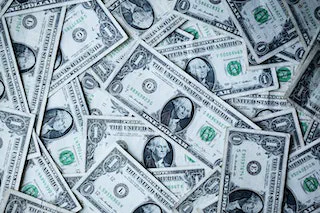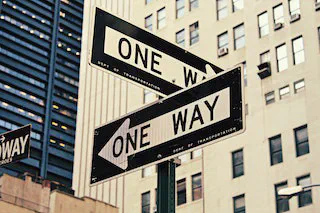
The deception of the financial system
- Matthieu P.J.
- Personal development
- January 23, 2021
"It is well enough that people of the nation do not understand our banking and monetary system, for if they did, I believe there would be a revolution before tomorrow morning."
—Henry Ford (1863–1947)
Most people do not understand how the financial system work—or even what it is, for that matter. We are born in a world that seems ruled by a mysterious force called ‘money’. Money is an abstract concept; yet it seems to orchestrate and condition how our material lives unfold. In its physical manifestation, money is well known to the masses as: coins and notes. The US dollar ‘green bill’ has developed a cult of its own, and is a symbol of the globalised financial system. Money fascinates people and in a Western world dominated by consumerism, should we be so surprised? Soon enough, the majority of kids will learn—or figure out for themselves—that the accumulation of money seems to be a key to living a ‘happy life’.
However what the masses ignore—unless they study economy—is the way this entire financial system was built and runs. The opening quote by Henry Ford should give you a taster. He touches on key feature of our financial system: the banking and monetary system. I’ll stick to the salient points here.
Table of Contents
Money creation
Some people say money is an energy. It’s not. Energy is neither created nor destroyed, whereas money is created out of thin air. Banks are granted the revolting privilege of creating money. When you go to your bank to get a £500,000 mortgage or a £2,000 loan, the same thing happens: your bank ‘creates’ money by crediting your account of the amount you requested whereas in return they do not hold the funds to cover 100% of the amount they give you. Typically, they are only holding around 10% of the amount they loan you, and it used to be even less—which evidently contributed to many financial crisis, just research what a bank run is and you will soon understand.
That mechanism of lending money that is not owned outright by banks is called “fractional reserve banking”. It is a cornerstone of the banking system.
Money creation is probably the biggest scam in modern history. Yet you rarely hear about it. Considering most people were born in that fraudulent system, it is not surprising that very few have developed an awareness of it. The last thing a fish notices is the water.
This is not to say that economy is bad in general and that we can or should get rid of money. I am just saying that the solution to the original problem has been distorted—some would say perverted. The original need for people was to be able to use a convenient currency that will allow to exchange goods without resorting to barter which was quite inconvenient and often needed a middle-man to mediate transactions. Currency was the answer, but initially it had a tangible value (typically: precious metal e.g. gold). Later on it moved to paper format yet it still could be exchanged against precious metal. What happened at some point in the course of the 20th century is that the money we use lost its correlation with any physical asset. More precisely: the 1944 Bretton Woods Agreement followed by the 1971 decision of the United States to stop the convertibility of the US dollar against gold. Both events allowed the US dollar to rise to the status of modern gold standard. What is a £20 or a US$20 note worth then? Well, it’s worth as much as people believe it’s worth. It’s based on the trust individuals have in the financial system. And currencies are seen as desirable only to the extent that the countries that issue them are seen as strong and reliable.
With the advent of digitalisation, money has moved even more into the intangible kingdom. The money you have on your bank account is essentially just a number stored on a computer system that is interconnected. It’s just a series of 0 and 1 written in binary code. Assuming someone had the right access, they could empty your account in a second because it’s just a digital record. As we are told we need to move to a cashless society (and it has accelerated as a courtesy of coronavirus), the concerns should be even higher. I doubt many people even realise that their wealth exists primarily in a fragile cyberspace until they exchange their money for something tangible.
Just to be clear, the system is not extremely fragile, because financial services firms invest extensively in technology and are aware of the importance of their IT systems. All the IT infrastructure on Earth is however sensitive to factors such as EMF & levels of radiation so for example events like a severe solar flare are real threats to power grids and the proper operation of IT equipments. The point I was making about someone emptying your bank accounts is that with sufficient skill but also leverage, a government or powerful organisation that has control over the system could do that. It would require the cooperation of financial firms because there are systems in place to correct potential bugs and transactions are validated between financial firms. However it is in theory possible and because of the digitalisation of banking, it could happen quickly. Without cash you can't keep stacks of notes under your mattress for a rainy day, an idea that still appeals to some.
Scarcity
Now we’re going to look at one of the tenets of modern economy. Despite what I was sharing above, most economists will try to convince you that we have a sophisticated and magnificent system that ‘works’. But it’s a fallacy. And one of the reason of this fallacy is that one its base assumptions is a lie.
Every system is built on assumptions. Economy is no exception. At the root of economy is the concept of scarcity . Scarcity is the belief that given a growing population of human beings on the planet, there is not enough goods for everyone. Scarcity is the opposite of abundance. Our world is dominated by the myth of scarcity, whereas it is the poor allocation and usage of our natural resources that give the illusion of scarcity. For example there’s well enough food for everyone on this planet but we can’t help having obese people on one side and people dying from famine on the other side. Can the Earth accommodate 8 billion inhabitants? Certainly—but not 8 billion who want the standards of living of the average American.
The belief in scarcity and the fear of not having enough has led to a rampant consumerism that precipitates the destruction of our natural habitat and environment. If you really want to address many of our global issues today, you need to address its foundation. People need to understand that scarcity is a lie and it’s only the greed of some people and their refusal to share equally that has led to our present situation. An entire system has been built on this false belief and the problem is not that this deceptive system exist. The problem is that we believed it, as a collective, and that we are still allowing it to endure to this day.
Inflation and time value of money
In order to keep the economic engine from stalling, another key feature of economy is the necessity for the price of goods to increase indefinitely. That is what is called inflation and if you listen to the economic news you can’t help but hearing about inflation. Why? Because it’s a key measure of the performance of the economy at a given time and it impacts many other variable of the complex economic machine.
Inflation is an insidious mechanism that sees the price of everything rise over time. It’s usually slow and barely noticeable from one year to the other. But over time it compounds to enormous amounts. For example: an annual 2% inflation rate over a period of 20 years leads to a multiplication of prices by a factor of nearly 1.5. That is best observed on large amounts such as property prices which means with the same example that instead of paying a house £200,000 twenty years ago, you will now have to spend £300,000 for the same house. For those who are old enough, try to remember the prices from 20 years ago and you will understand what inflation truly means. In economy, this phenomenon is called the time value of money and reflects the fact that £100 is not worth the same today as in last year or one year from now. With the constant creation of debt, inflation is a necessity to keep the system from collapsing.
Yet, can we be so proud of our system and believe it is worth saving? Is it normal that millions are enslaved and must work endlessly at jobs paying poor wages while enduring a cost of life that doesn’t stop going higher and higher?
Inflation is a real down-side of the economic system. It condemns us to wanting always more because the baseline of prices keeps going up. It is a by-product of the mechanics of our economy and is linked to interest rates and the cost of borrowing money. We haven't found another better system yet, but that doesn't mean it does NOT exist!
Final thoughts
Economy is a fascinating discipline and most people would benefit from learning at least a minimum about it. But in a system like ours, it’s no surprise that is it not included in the default curriculum of every kid. Once more, knowledge is the antidote.
It’s quite shocking how everyone have been embarked unwittingly on the biggest fraud in history, for several generations already, and yet our system still runs—although the 2008 global financial crisis had the potential of wiping out the entire system and needed some serious recovery measures.
When you look at the concepts and ideas underlying our modern financial system, and you take time for reflection, you should see that the system is flawed and biased. And it starts with the myth of scarcity that is so ingrained in the collective mind, that it blinds us from seeing the unpleasant truth: it is our misusage of resources that is the true issue.
The banking and monetary system is a scam that is allowed to continue. The revolution Henri Ford was talking about has never really happened, yet the regular and increasingly severe financial crisis have given us serious warnings that the system was fragile and needed some specific measures to keep running. But when are we going to uncover the fraud? The system is built upon false assumptions and is doomed to collapse anyway. Prices cannot increase forever more while resources are being wasted and the spread of wealth between the richest and poorest keeps widening. And finally, will [coronavirus] be the ideal scapegoat for rebooting the entire economic system—while in fact it was by design that the system was flawed?
To be more specific, the tenets of the banking and monetary system are not satisfactory in terms of fairness to the general population. It's not the entire system that is rotten. But we can certainly do better than today and for example revoke some of the unfair privileges given to banks. Just because we haven't found a way to function without a monetary system, it does not mean we need to drop the entire thing. It means that we should reform it. There are respectable financial firms out there and this is a vast industry that serves a purpose. But finance also has a power that is considerably high in our modern societies. Could we finally downgrade finance to its real place: a facilitator for humans to grow their societies, instead of a key driver in human evolution?


